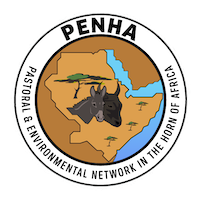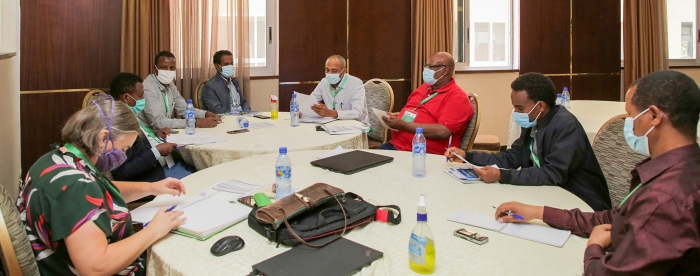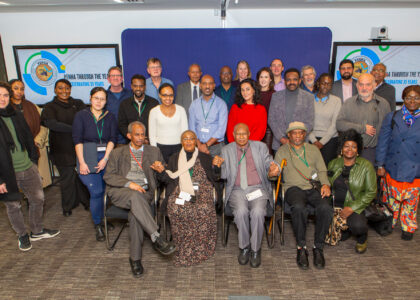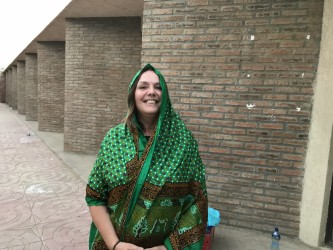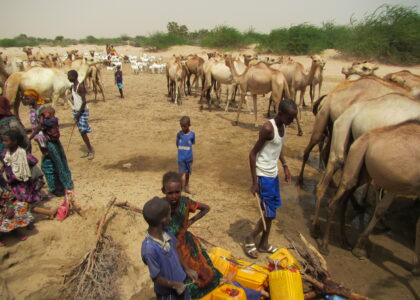Ethiopia – 12 April, 2021
By PENHA team
On Saturday 10 April, the 46 participants of a national workshop on dryland restoration and dry forest management ended an intensive three days of discussions with a huge result.
The final declaration – or “a major breakthrough” as one senior participant described it – maps out a shared vision between the federal government, in the shape of the Environment, Forest and Climate Change Commission (EFCCC), and representatives of six regional governments (Afar, Amhara, Benishangul-Gumuz, Oromia, Somali and Tigray), international research institutions, and NGOs.
It emphasizes the central importance of the drylands to Ethiopia’s national wellbeing, and in achieving its ambitious climate mitigation commitments. The drylands make up the bulk of Ethiopia’s land mass and account for some 70% of Ethiopia’s emissions reduction potential.
Specifically, the declaration confirms a resolve to work together, towards greatly enhanced community participation to identify options for livelihoods and sustainable landscape management, develop inclusive value chains for dryland forest products, increase coordination across sectors and actors, and improve knowledge management and long term planning, as components of a national drylands restoration strategy and action plan with clear lines of responsibility and accountability.
A powerful opening speech was delivered by Ato Tilaye Nigussie, Director of the Forest Sector Transformation Unit, speaking on behalf of the Deputy Commissioner of the EFCCC, H.E. Kebede Yimam. This laid out the policy framework established by the government, and related commitments on climate mitigation, forests and trees. Ato Tilaye also recognized the challenges, emphasizing the need for clarity in strengthening coordination, as it is not clear at present which agencies are responsible for which results, adding that “this workshop is an important stepping stone for maintaining the momentum established so far.” In addition, Tesfaye Shiferaw of the Agency for Civil Society Organisations (ACSO) spoke for its director, Jima Dilbo, welcoming this initiative in a new era of government-CSO collaboration in which NGOs are encouraged to contribute towards policy formulation.
Dr Mohammod Musa, PENHA’s Ethiopia Country Representative offered “best wishes for good deliberations and I hope you will come with specific recommendation, achievable and practical, and ways forward.” And PENHA Regional Programmes Coordinator and the energy behind much of the workshop organzation, Amsale Shibeshi, reminded participants that “our aim is to strengthen, coordination, collaboration and information sharing, and to start working towards a national strategy on dryland restoration.”
In the first session, the overarching themes and context of the workshop were set out in presentations by leading national figures in Ethiopian dryland restoration and climate mitigation efforts, Prof Mitiku Haile and Dr Habtemariam Kassa (CIFOR). Dr Yetebitu Moges (REDD+ Secretariat) highlighted the international perspective of Ethiopian dry forests in relation to its Nationally Determined Contributions (NDCs). Dr Wubalem Tadesse (EEFRI) offered reasons for the failure to coordinate across agencies, and a lively exchange with Ato Tilaye in the presence of Demeke Tsehay of the National Planning Commission, the body charged with ensuring coherence across government, enabled a rich discussion on the scope to rationalize institutional set-ups that can incentivize coordination.
Dr Yigardu Mengesha (EEFRI) described the range of suitable indigenous seeds available from her national governmental organization and the challenges of managing seedlings in dryland environments. EEFRI’s Director Dr Agena Anjulo presented findings from recent research on the expanding problem of bush encroachment in Borena. The need for solution-oriented research was emphasized, rather than purely academic work not directly linked to the needs of ongoing restoration and forest management programmes. Dr Aklilu Mekuria described the work of the NGO WeForest and the need to direct carbon payments to communities for strengthening and diversifying livelihoods, and to build governmental institution capacity at regional and federal levels. These were followed by views from representatives of six regions, on their experience, challenges and opportunities, stimulating lively discussions. Employing youth in restoration efforts was a recurring theme.
In group sessions, experiences from across the country showed different approaches to landscape restoration, including area exclosures in Tigray, participatory forest management in Benishangul-Gumuz, and rangeland rehabilitation in Somali Region. But all agreed on the centrality of economic benefits to local communities, without which restoration efforts cannot be sustained. Participants from Somali stated the effectiveness of traditional institutions and customary law, pointing to successes in maintaining biodiversity and commercially valuable tree resources, especially frankincense. Those from Afar drew attention to some downsides of traditional, clan-based natural resource management associated with local conflict. But given ongoing violence between Afar and Somali clans, it was significant that representatives of these two regions sat together to discuss solutions to their environmental and development challenges.
Presentations and discussions also focused on charcoal and the need to develop alternative energy sources. Dr Dawit Gebrezgabiher (Mekelle University) presented a recent assessment with Prof Mitiku Haile, informing Dr Belayneh Ayele of the Regional Environmental Authority (Amhara Region) that much of the charcoal currently being used in Tigray is sourced from Amhara, with conflict-related power cuts having induced an environmentally devastating increase in demand for wood fuel. The problem of invasive prosopis trees was highlighted in Afar and Somali, with a set of identified solutions proposed. Dubale Admasu (USAID) described the development of a national prosopis control and use strategy, building on work by Farm Africa, PENHA, GIZ and others, endorsed by the government. Dubale also acknowledged the foundational work of TBI’s Nick Pasiecznik which informed his own research on the issue. A regional conference organized by GIZ, in which PENHA presented lessons from Somaliland, led to a multi-stakeholder process that translated the strategy into set of actions that is now being implemented.
Ahmed Edris, Economic Advisor to the President of Afar Region noted that “We are now on the second day but I have gained the experience that I could not get in two years.” The next steps were outlined on the third and final day of the workshop. Regional action plans were developed, setting out priorities and key actors, with agreement on the membership of task teams in four thematic areas. Dr Yigardu argued that PENHA should not only lead the development of a national dryland restoration strategy, that is ultimately owned by the EFCCC, but that it should also play a role in its implementation. So over the next nine months, PENHA will organize quarterly meetings with inputs from the regions and community consultations integrated into a multi-stakeholder ‘Ethiopian Drylands Restoration Platform’. A draft strategy with an outline of implementation modalities will be presented to the EFCCC before the end of 2021.
Ethiopia is contending with multiple, almost Biblical, crises – locusts, floods, drought, conflict and Covid – so the fact that so many chose to participate is a testament to the commitment to tackling issues related to dryland forest management and climate change mitigation. The warm spirit in the room extended to London and Wageningen, where PENHA and TBI directors and senior staff were able to address participants via Zoom, expressing solidarity and philosophical outlooks on inclusive participation, peace building and sustainable development.
The workshop was organized by PENHA (the Pastoral and Environmental Network in the Horn of Africa) and TBI (Tropenbos International), with the financial support of the Ministry of Foreign Affairs of the Netherlands and the backing of the Government of Ethiopia. It is also the first formal event in this new partnership, as part of TBI’s Working Landscape programme, building on reviews, interviews and field surveys conducted in 2020. Special thanks also to EFCCC Commissioner, Professor Fekadu Beyene, and Deputy Commissioner Kebede Yimam. The workshop was held in the Capital Hotel, Addis Ababa, 8-10 April 2021, with appropriate Covid-safe measures in place.
For further information
-Amsale Shibeshi – Regional programmes coordinator, PENHA, Somaliland/Ethiopia
(ashibeshi@hotmail.com, +251 93 0800881, +252 63 4416203 for Whatsapp)
-Nick Pasiecznik – Dryland restoration coordinator, Tropenbos International, the Netherlands (nick.pasiecznik@tropenbos.org)
Note: News content first appeared on the TBI website.
